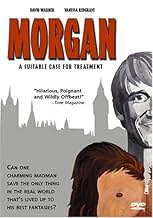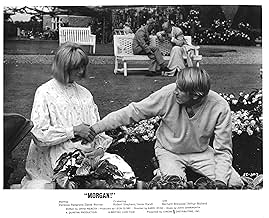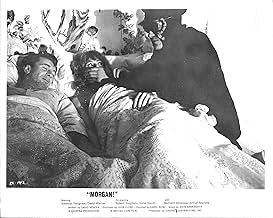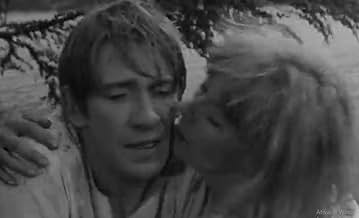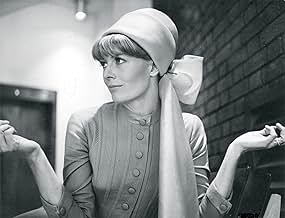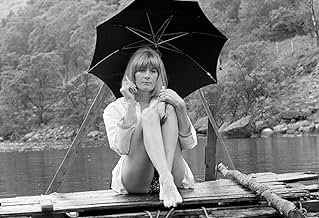IMDb RATING
6.5/10
2.2K
YOUR RATING
After his wife leaves him for his former best friend, a failed London artist begins his descent into madness in trying to win her back.After his wife leaves him for his former best friend, a failed London artist begins his descent into madness in trying to win her back.After his wife leaves him for his former best friend, a failed London artist begins his descent into madness in trying to win her back.
- Nominated for 2 Oscars
- 4 wins & 12 nominations total
Angus MacKay
- Best Man
- (as Angus Mackay)
Jack Armstrong
- Guest at Wedding Reception
- (uncredited)
Bernard Barnsley
- Workman
- (uncredited)
- Director
- Writer
- All cast & crew
- Production, box office & more at IMDbPro
Featured reviews
In 1966 when I lived in London I fully expected to see this movie. Many of my friends, especially the girls, were raving about it. Funds diverted to beer, or girls, deprived me of the chance. So it has taken me nearly forty years to actually see it. Thoroughly of the time, and yet it must have seemed so radical even then. I watched it as a chaser to Alfie (Michael Caine) and it was interesting to compare the styles of two icons of British female acting, Redgrave and Asher, in one evening. Both movies dealt with serious and potentially unattractive issues; adultery, abortion, promiscuity and mental illness and injected enough humor into the screenplay to keep ones attention the while. I am prompted to revisit "Up the Junction" and " A Taste of Honey" with Rita Tushingham, another sixties icon.
David Warner is, to my mind, one of the most gifted actors working in films today. He is able to take just about any role in just about any film and invest it with life and interest. In fact, he is the sole reason to ever want to see a great number of films. That said, "Morgan" is a treat because it's one of the few films where Warner gets to play the lead. He doesn't get the girl and he's stark raving mad throughout, but he's still the lead.
This film is very much of its time, but it's still quite enjoyable. Morgan's anarchist antics are always unpredictable and sweet in a psychotic kind of way. And considering the main character's obsession with gorillas, it's interesting to see the film now in light of Warner's appearance in Tim Burton's remake of "Planet of the Apes." Must have felt like deja vu to him.
Recommended for David Warner fans and people who like their comedies a little off-kilter.
This film is very much of its time, but it's still quite enjoyable. Morgan's anarchist antics are always unpredictable and sweet in a psychotic kind of way. And considering the main character's obsession with gorillas, it's interesting to see the film now in light of Warner's appearance in Tim Burton's remake of "Planet of the Apes." Must have felt like deja vu to him.
Recommended for David Warner fans and people who like their comedies a little off-kilter.
This movie was funny as hell. David Warner is an ace-- a great comedic actor, and the entire cast should have received awards. All the ingredients for a great comedy were there-- gorilla suits, slapstick comedy at a wedding celebration involving a gorilla, the main character being insane-- what more could you ask for. I saw the movie on late night t.v. and I rolled out of bed laughing.
An uncredited actor who also did an outstanding job in this movie was Billy Reil, playing the part of inspector Kowalski. It was especially funny when he thought the bad guy was heading for his office and he ended up konking his secretary over the head with a flower pot.
An uncredited actor who also did an outstanding job in this movie was Billy Reil, playing the part of inspector Kowalski. It was especially funny when he thought the bad guy was heading for his office and he ended up konking his secretary over the head with a flower pot.
I thought the movie hilarious in '66 and still do. Of course, I can see why social conservatives take offense since the movie basically mocks settled convention. For example, when a gorilla-clad Morgan crashes the wedding party, it's like the intrusion of primal instinct on all that's refined and holy. But even more troubling, movie communists are portrayed as almost likably human, instead of the usual weasels or monsters of Hollywood lore. For Americans, that took real getting used to then, and I expect still does.
Reviewer screaminmimi is, I think, spot-on in her commentary. Still, I want to venture a perspective on Morgan's weird behavior since he's such a fascinating character, for me, at least. He's like a believer who's lost faith—he keeps the Marxist icons on his car, but in his heart no longer believes in the revolution. Instead, as the dialog indicates, the weight of mindless convention is crushing his sensitive nature. What's more, despair is really rubbed in when Leonie leaves him for the asinine Napier, the epitome of the unworthy, in Morgan's eyes, at least.
So, having given up on politics and despising the conventional, he retreats into the fantastic, non-human world of the gorilla by taking on the alter-ego of the primitive, which he then uses to pursue his ex-wife. In Morgan's mind maybe Leonie will respond to the magnetism of the primitive by bellowing out his call. So he conducts his wacky efforts at winning her back by donning a gorilla costume, and we get some of the movie's loonier comedic set-ups.
Consider also that great scene at Marx's bust in Highgate when the camera plays up the over-hanging brow and ape-like visage. Morgan responds with an ape-like grunt, which Mom construes as disrespect. It's not. In fact, with that grunt he's incorporated the political into his new primitive fantasy. It's only later on, atop the trash heap, when he's lost Leonie and given up his gorilla alter-ego, that the political suddenly reasserts itself and with a vengeance. At that point, he imagines himself executed by Marxist guerrillas, perhaps in guilt over not fulfilling the Leninist expectations others had for the young Morgan. Defeated in so many ways, he's now ready to be carted off to the loony bin, but not without a lingering spark.
Of course, there's also Leonie, the trigger of his desperation. She's really torn since she responds to Morgan's rebellious nature, on one hand, but is used to the conventional comforts of her prosperous class, on the other. It's clear that she's attracted to him, but can't take living with such an unpredictable cuss. So she retreats back to the prospect of the conventional with Napier. Asked by Morgan, at one point, why she prefers the conventional, she's perplexed and can't really answer, as if she's never actually thought about it. So, not only does Morgan lose out to convention, he loses out to a bunch of rules for which there's no apparent reason.
The movie itself is very much in the emerging hip style of the day. Director Reisz films in brash, take no prisoners fashion, unafraid of breaking the rules. His cast of Warner and Redgrave are perfect for their roles. She looks every inch the well-kept daughter and wife who occasionally likes to let her hair down, while he manages a complex role in persuasive fashion.
To me, the comedy set-ups are funny as heck, though one might question the explosive set- up under the bed. Still, I take Morgan's assault on the upper-class as akin to the Marx Bros. irreverent brand of humor in the 1930's. In fact, some of his antics could be likened to Harpo Marx's absurd stage props at a time when the brothers wreaked havoc among that day's well upholstered.
Sure, some of the cinematic style may look outdated. But neither the laughs nor the targets are. To me, they endure. After fifty years, Morgan is still an exceptional movie.
Reviewer screaminmimi is, I think, spot-on in her commentary. Still, I want to venture a perspective on Morgan's weird behavior since he's such a fascinating character, for me, at least. He's like a believer who's lost faith—he keeps the Marxist icons on his car, but in his heart no longer believes in the revolution. Instead, as the dialog indicates, the weight of mindless convention is crushing his sensitive nature. What's more, despair is really rubbed in when Leonie leaves him for the asinine Napier, the epitome of the unworthy, in Morgan's eyes, at least.
So, having given up on politics and despising the conventional, he retreats into the fantastic, non-human world of the gorilla by taking on the alter-ego of the primitive, which he then uses to pursue his ex-wife. In Morgan's mind maybe Leonie will respond to the magnetism of the primitive by bellowing out his call. So he conducts his wacky efforts at winning her back by donning a gorilla costume, and we get some of the movie's loonier comedic set-ups.
Consider also that great scene at Marx's bust in Highgate when the camera plays up the over-hanging brow and ape-like visage. Morgan responds with an ape-like grunt, which Mom construes as disrespect. It's not. In fact, with that grunt he's incorporated the political into his new primitive fantasy. It's only later on, atop the trash heap, when he's lost Leonie and given up his gorilla alter-ego, that the political suddenly reasserts itself and with a vengeance. At that point, he imagines himself executed by Marxist guerrillas, perhaps in guilt over not fulfilling the Leninist expectations others had for the young Morgan. Defeated in so many ways, he's now ready to be carted off to the loony bin, but not without a lingering spark.
Of course, there's also Leonie, the trigger of his desperation. She's really torn since she responds to Morgan's rebellious nature, on one hand, but is used to the conventional comforts of her prosperous class, on the other. It's clear that she's attracted to him, but can't take living with such an unpredictable cuss. So she retreats back to the prospect of the conventional with Napier. Asked by Morgan, at one point, why she prefers the conventional, she's perplexed and can't really answer, as if she's never actually thought about it. So, not only does Morgan lose out to convention, he loses out to a bunch of rules for which there's no apparent reason.
The movie itself is very much in the emerging hip style of the day. Director Reisz films in brash, take no prisoners fashion, unafraid of breaking the rules. His cast of Warner and Redgrave are perfect for their roles. She looks every inch the well-kept daughter and wife who occasionally likes to let her hair down, while he manages a complex role in persuasive fashion.
To me, the comedy set-ups are funny as heck, though one might question the explosive set- up under the bed. Still, I take Morgan's assault on the upper-class as akin to the Marx Bros. irreverent brand of humor in the 1930's. In fact, some of his antics could be likened to Harpo Marx's absurd stage props at a time when the brothers wreaked havoc among that day's well upholstered.
Sure, some of the cinematic style may look outdated. But neither the laughs nor the targets are. To me, they endure. After fifty years, Morgan is still an exceptional movie.
Say "1960's British comedy movie" and already some people are thinking of impossibly mod dialogue, dated images and an obsession with pop and quick sex. This movie shouldn't work but it does. Try pitching a concept of an insane young communist obsessed with gorillas and unable to come to terms with the break up of his marriage to today's Hollywood executives and you'd get thrown out of their offices. But it is genuinely funny and sad, it's well directed and you can't speak highly enough of David Warner in the lead role.
I've always thought that Warner is at his best when his seemingly unsympathetic characters engender some sympathy. The retarded man in "Straw Dogs", the jaded Captain in "Cross of Iron", the put apon conscript in "The Bofors Gun" to name but a few. Morgan is his ultimate portrayal of this type of character.
I've always thought that Warner is at his best when his seemingly unsympathetic characters engender some sympathy. The retarded man in "Straw Dogs", the jaded Captain in "Cross of Iron", the put apon conscript in "The Bofors Gun" to name but a few. Morgan is his ultimate portrayal of this type of character.
Did you know
- TriviaVanessa Redgrave's Best Actress Oscar nomination for this movie coincided with sister Lynn Redgrave's similar nomination for Georgy Girl (1966). Such a coincidence had occurred only once before when sisters Joan Fontaine and Olivia de Havilland respectively vied for the Best Actress Oscar for Soupçons (1941) and Par la porte d'or (1941).
- GoofsCrew reflected in the window of the car that Leonie gets into at the start of the film.
- Quotes
Morgan Delt: [to Leoni] Do you really want little Napiers growing inside you?
- ConnectionsEdited from King Kong (1933)
- How long is Morgan!?Powered by Alexa
Details
- Runtime
- 1h 37m(97 min)
- Color
- Aspect ratio
- 1.66 : 1
Contribute to this page
Suggest an edit or add missing content


